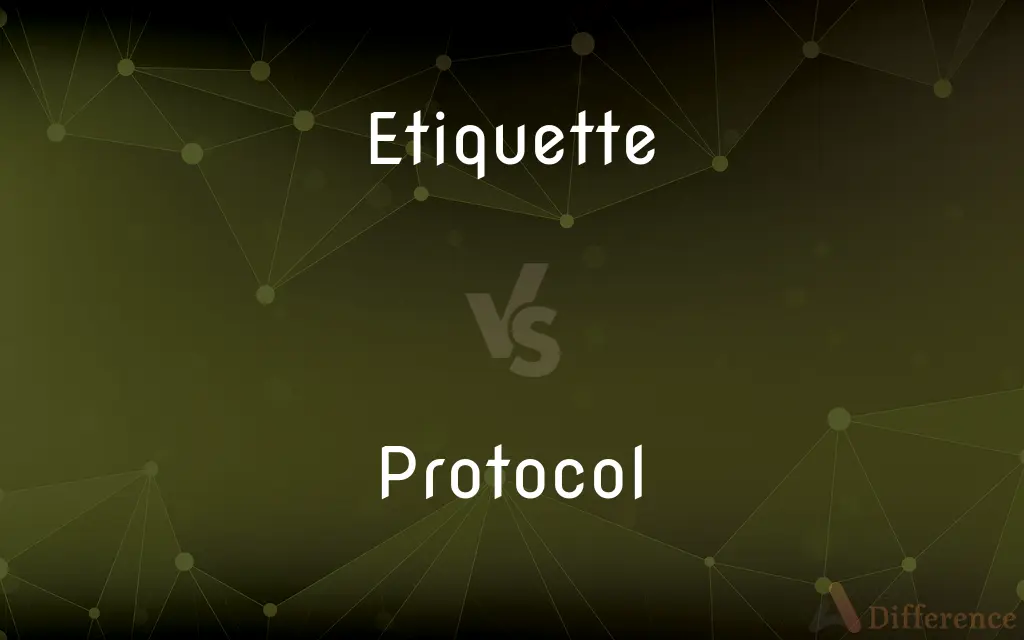Etiquette vs. Protocol — What's the Difference?
By Tayyaba Rehman & Urooj Arif — Updated on March 14, 2024
Etiquette refers to the customary code of polite behavior, while protocol involves formal rules and conventions.

Difference Between Etiquette and Protocol
Table of Contents
ADVERTISEMENT
Key Differences
Etiquette encompasses the informal guidelines that govern the social and professional behaviors deemed appropriate within society. It includes manners, courtesy, and the unwritten rules that facilitate smooth interpersonal interactions, such as saying "please" and "thank you," or knowing how to behave at a dinner party. Protocol, on the other hand, is more formalized and often relates to diplomatic, governmental, or institutional procedures. It includes specific rules and conventions that dictate how certain events are organized, how officials are ranked, and how interactions take place in formal settings.
While etiquette can vary widely based on cultural, social, and individual preferences, often adapting to the context and evolving over time, protocol tends to be more rigid and standardized, often documented in official guidelines or manuals. For example, business etiquette might suggest a firm handshake at a meeting, whereas diplomatic protocol would dictate the precise order in which dignitaries are greeted or seated according to their rank.
Etiquette often aims at ensuring comfort, respect, and harmony in social interactions, emphasizing thoughtfulness and consideration for others. Protocol, while also concerned with respect and order, serves to maintain decorum and hierarchy in official settings, ensuring that procedures are followed correctly and that interactions adhere to established norms.
In practice, etiquette might involve knowing how to dress for a specific occasion, how to write a thank-you note, or the proper way to address someone in a letter or conversation. Protocol could involve the formalities of a state dinner, the correct way to display national flags, or the procedures for a military funeral.
The mastery of etiquette can enhance personal and professional relationships, facilitating smoother social interactions and communication. Understanding and adhering to protocol is essential in formal or official contexts, where deviations can lead to misunderstandings or breaches in decorum. Both etiquette and protocol contribute to the orderly and respectful conduct of individuals within society, but they operate in different spheres and with varying degrees of formality.
ADVERTISEMENT
Comparison Chart
Definition
Customary code of polite behavior in society or among members of a particular profession or group.
Formal rules and conventions governing official conduct and diplomatic affairs.
Context
Social and professional settings.
Diplomatic, governmental, and institutional settings.
Flexibility
More adaptable and can vary by culture, context, and individual preference.
Generally rigid and standardized, often documented in official manuals.
Purpose
To ensure comfort, respect, and smooth social interactions.
To maintain decorum, hierarchy, and order in official procedures.
Examples
Table manners, greeting etiquette, correspondence etiquette.
Diplomatic immunity, state ceremonies, military honors.
Compare with Definitions
Etiquette
Guidelines for polite and appropriate behavior.
Following dining etiquette, he waited for everyone to be served before eating.
Protocol
Formal rules governing official conduct and ceremonies.
The summit followed strict diplomatic protocol for greeting each nation's leader.
Etiquette
Broad, covering a wide range of everyday interactions.
Email etiquette is crucial for professional communication.
Protocol
Specific to formal, official, or ceremonial occasions.
The protocol for state funerals involves national flags at half-mast.
Etiquette
Informal and often unwritten, learned through observation and experience.
Knowing when to listen rather than speak is part of conversational etiquette.
Protocol
Often fixed and precisely outlined in official documents.
Military protocol dictates the order of precedence during parades.
Etiquette
Focuses on thoughtfulness and consideration for others.
Sending a thank-you note after an interview is good etiquette.
Protocol
Maintains hierarchy, decorum, and procedural correctness.
The signing ceremony adhered to international treaty protocol.
Etiquette
Adjusts to different social and cultural contexts.
She learned the local etiquette to respect the customs during her travels.
Protocol
Formal and documented, requiring specific knowledge or training.
Protocol officers ensure that diplomatic events comply with international standards.
Etiquette
Etiquette ( and ; French: [e.ti.kɛt]) is the set of conventional rules of personal behaviour in polite society, usually in the form of an ethical code that delineates the expected and accepted social behaviours that accord with the conventions and norms observed by a society, a social class, or a social group. In modern English usage, the French word étiquette (ticket) dates from the year 1750.
Protocol
The official procedure or system of rules governing affairs of state or diplomatic occasions
Protocol forbids the prince from making any public statement in his defence
Etiquette
The customary code of polite behaviour in society or among members of a particular profession or group
The rules of etiquette are changing
Court etiquette was now familiar to Joan
Etiquette books
Protocol
The original draft of a diplomatic document, especially of the terms of a treaty agreed to in conference and signed by the parties
Hungary and the Soviet Union signed a trade protocol
Signatories to the Montreal Protocol
Etiquette
The practices and forms prescribed by social convention or by authority.
Protocol
A formal or official record of scientific experimental observations
Protocols of published cases frequently lack this vital information
Etiquette
The forms required by a good upbringing, or prescribed by authority, to be observed in social or official life; observance of the proprieties of rank and occasion; conventional decorum; ceremonial code of polite society.
Protocol
A set of rules governing the exchange or transmission of data between devices.
Etiquette
The customary behavior of members of a profession, business, law, or sports team towards each other.
Protocol
The forms of ceremony and etiquette observed by diplomats and heads of state.
Etiquette
A label used to indicate that a letter is to be sent by airmail.
Protocol
A code of correct conduct
Safety protocols.
Academic protocol.
Etiquette
The forms required by good breeding, or prescribed by authority, to be observed in social or official life; observance of the proprieties of rank and occasion; conventional decorum; ceremonial code of polite society.
The pompous etiquette to the court of Louis the Fourteenth.
Protocol
The first copy of a treaty or other such document before its ratification.
Etiquette
Rules governing socially acceptable behavior
Protocol
A preliminary draft or record of a transaction.
Protocol
The plan for a course of medical treatment or for a scientific experiment.
Protocol
(Computers) A standard procedure for regulating data transmission between computers.
Protocol
To form or issue protocols.
Protocol
The minutes, or official record, of a negotiation or transaction; especially a document drawn up officially which forms the legal basis for subsequent agreements based on it.
Protocol
An official record of a diplomatic meeting or negotiation; later specifically, a draft document setting out agreements to be signed into force by a subsequent formal treaty.
Protocol
(international law) An amendment to an official treaty.
Protocol
The first leaf of a roll of papyrus, or the official mark typically found on such a page.
Protocol
The official formulas which appeared at the beginning or end of certain official documents such as charters, papal bulls etc.
Protocol
(sciences) The original notes of observations made during an experiment; also, the precise method for carrying out or reproducing a given experiment.
Protocol
The official rules and guidelines for heads of state and other dignitaries, governing accepted behaviour in relations with other diplomatic representatives or over affairs of state.
Protocol
An accepted code of conduct; acceptable behaviour in a given situation or group.
Protocol
(computing) A set of formal rules describing how to transmit or exchange data, especially across a network.
Protocol
(medicine) The set of instructions allowing a licensed medical professional to start, modify, or stop a medical or patient care order.
Protocol
To make a protocol of.
Protocol
To make or write protocols, or first drafts; to issue protocols.
Protocol
The original copy of any writing, as of a deed, treaty, dispatch, or other instrument.
Protocol
The minutes, or rough draught, of an instrument or transaction.
Protocol
A preliminary document upon the basis of which negotiations are carried on.
Protocol
To make a protocol of.
Protocol
To make or write protocols, or first draughts; to issue protocols.
Protocol
(computer science) rules determining the format and transmission of data
Protocol
Forms of ceremony and etiquette observed by diplomats and heads of state
Protocol
Code of correct conduct;
Safety protocols
Academic protocol
Common Curiosities
Is etiquette always formal?
No, etiquette can range from casual to formal, adapting to the context of the interaction.
Are there penalties for not following protocol?
In formal settings, failing to follow protocol can lead to diplomatic faux pas, misunderstandings, or breaches in decorum, potentially having serious implications.
Does etiquette differ from culture to culture?
Yes, etiquette can vary significantly across different cultures and social groups.
Can someone be trained in protocol?
Yes, professionals such as protocol officers, diplomats, and military personnel often receive specialized training in protocol.
How is protocol enforced in international relations?
Protocol in international relations is maintained through mutual respect, conventions, and sometimes legal obligations, with diplomatic norms guiding interactions.
Can personal etiquette influence career advancement?
Effective use of personal etiquette can positively impact professional relationships and opportunities, contributing to career advancement.
Can protocol ever change?
While protocol is generally rigid, it can be updated or modified through official channels to reflect changes in societal norms or international agreements.
Are there resources available for learning etiquette and protocol?
Numerous resources, including books, courses, and online content, are available for those interested in learning more about etiquette and protocol.
Is it possible to overemphasize protocol?
Overemphasis on protocol can sometimes lead to rigidity, hindering adaptability and personal connections in certain situations.
How does one learn etiquette?
Etiquette is often learned through observation, experience, and sometimes formal education, such as etiquette classes.
Is knowledge of etiquette important in professional settings?
Yes, understanding and practicing proper etiquette can enhance professionalism and interpersonal relations in the workplace.
Can one be proficient in etiquette but not in protocol?
Yes, it's possible to be well-versed in social etiquette while having limited knowledge of formal protocol, as they involve different sets of skills and knowledge.
How do etiquette and protocol interact at formal events?
At formal events, etiquette governs individual behaviors, while protocol dictates the overall structure and official procedures of the event.
What role does protocol play in the military?
In the military, protocol dictates rank hierarchies, ceremonial procedures, and the conduct of personnel, ensuring order and discipline.
Can ignoring etiquette lead to social isolation?
While it varies by situation, consistently ignoring social etiquette can lead to negative perceptions and potentially social isolation.
Share Your Discovery

Previous Comparison
Fault vs. Defect
Next Comparison
Defect vs. DamageAuthor Spotlight
Written by
Tayyaba RehmanTayyaba Rehman is a distinguished writer, currently serving as a primary contributor to askdifference.com. As a researcher in semantics and etymology, Tayyaba's passion for the complexity of languages and their distinctions has found a perfect home on the platform. Tayyaba delves into the intricacies of language, distinguishing between commonly confused words and phrases, thereby providing clarity for readers worldwide.
Co-written by
Urooj ArifUrooj is a skilled content writer at Ask Difference, known for her exceptional ability to simplify complex topics into engaging and informative content. With a passion for research and a flair for clear, concise writing, she consistently delivers articles that resonate with our diverse audience.















































